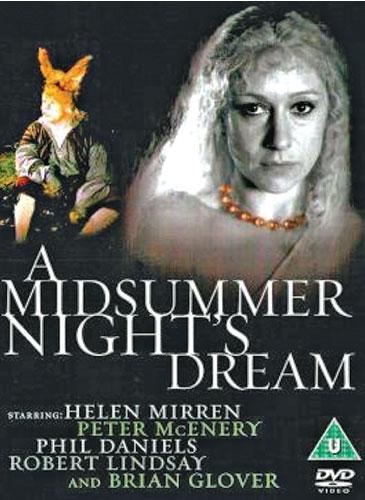
The BBC’s movie adaptation of William Shakespeare’s A Midsummer Night’s Dream stars Helen Mirren, Peter McEnery, Phil Daniels, Robert Lindsay and Brian Glover. The film begins in Athens where the lovers Hermia and Lysander want to get married, but Hermia’s father Egeus opposes the marriage because he wants Hermia to marry Demetrius.
In ancient Greece during the fifteenth century, Athenian law decreed that a girl who refused to marry the man chosen by her parents should either be condemned to death or to become a nun which was very wrong, unjust and tyrannical, because as an individual, a girl has the right to marry the man she loves, and she should not be coerced into marrying a man she is not interested in or to be a nun.
In order to escape this terrible predicament Lysander and Hermia decide to run away from Athens and get married, and decide to meet in the forest outside Athens. They confide in Helena who betrays them by revealing their secret to Demetrius who follows them into the forest. Helena is in love with Demetrius and follows him into the forest and tries to make him fall in love with her which is grotesque because Demetrius spurns her advances.
The forest outside Athens is ruled by the Fairy King Oberon who watches the encounter between Helena and Demetrius and takes pity on Helena and asks his attendant, a fairy named Puck to smear Demetrius’s eyes with a magic love potion while he is sleeping, which would make Demetrius fall in love with Helena when he sees her upon awakening.
But Puck mistakes Lysander for Demetrius and smears Lysander’s eyes with the magic potion and Lysander sees Helena upon awakening and falls in love with her. Both Demetrius and Lysander pursue Helena and confusion and misunderstanding ensues as a result and it is resolved only after Puck smears Lysander’s eyes with another magic potion that undoes the effect of the love potion and he stops pursuing Helena.
The parallel plot focuses on the relationship between Oberon and the Fairy Queen Titania who are lovers and have a quarrel apparently over an Indian baby at the beginning of the film. Oberon decides to punish and humiliate Titania by smearing her eyes with the magic love potion while she is sleeping and makes sure that she sees and falls in love with the ass headed weaver named Bottom upon awakening, which highlights the dark side of the film and Shakespeare’s play. Later on Oberon smears Titania’s eyes with the other magic potion which undoes the effect of the love potion which made her fall in love with an ass and reconciles with Titania.
The film presents the play-within-the-play titled ‘Pyramus and Thisbe’ which enacts the tragic love story of the characters by the same name and is similar to that of Romeo and Juliet, which can be compared and contrasted with AMidsummer Night’s Dream, as it begins with a couple defying parental opposition to get married and culminates with three happy marriages. The film stays faithful to Shakespeare’s play which juxtaposes fantasy with reality, and explores the relationship between the real and the supernatural.
It creates the visual effects of an enchanting and magical fairy kingdom in the forest, and at the end of film the fairies enter Athens after midnight, at fairy time, to bless the three married couples and the children they will have in the future. In the film, as in Shakespeare’s play, the epilogue is delivered by Puck who asks the audience to consider the play as a dream which illuminates Shakespeare’s pre-occupation with the relationship between the real and the supernatural.
